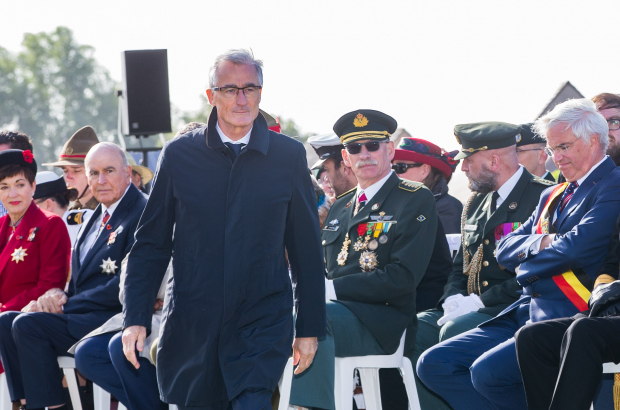- Daily & Weekly newsletters
- Buy & download The Bulletin
- Comment on our articles
Flemish minister-president looks back at First World War centenary
Sunday, 11 November, is a national holiday in Belgium. But it’s no average Armistice Day. The day marks exactly 100 years since the end of the First World War.
Flanders has many events planned to honour the day, which is also the official end of its centenary commemoration of the First World War. The goals of the government’s ambitious centenary programme was to spread the message “War never brings peace”, to increase Flanders’ international visibility and to use tourist activities to discuss a period of history that was devastating, poignant and immensely complicated all at once.
“A basic principle was to commemorate all victims of the war, leaving behind the old idea of ‘winners and losers’,” says Flemish minister-president Geert Bourgeois.. This approach could be seen, for example, in The Names List, a register of some 600,000 victims on both sides. Based on the list, Flemish artist Koen Vanmechelen led a project that saw the public chipping in to make 600,000 identical sculptures, now part of the ComingWorldRememberMe art installation at the Palingbeek recreational site in Ypres.
Poignant events
Among the centenary’s major attractions were “classic” destinations in the Westhoek area of West Flanders – home to the front line for much of the Great War. These include the Tyne Cot cemetery and memorial in Zonnebeke, Talbot House in Poperinge and the In Flanders Fields Museum in Ypres. But the programme included a large variety of events, activities and art installations all over Flanders.
In 2014, the City of Antwerp commemorated the start of the centenary by building The Peace Bridge, a historical recreation of a pontoon that spanned the Scheldt in 1914. It was built to allow supplies to reach the city from the west and later served as an escape route for the army and tens of thousands of civilians.
In July 2017, ceremonies memorialising the 100th anniversary of the Battle of Passchendaele were attended by many foreign dignitaries, including the British royals Prince Charles, Prince William and Catherine Middleton. In the summer of this year, meanwhile, some 10,000 people attended a 12-hour marathon of music and spoken word in Ypres dedicated to remembrance and peace for the future.
As people from about 100 current nations participated in the battles in Flanders’ fields, international collaboration was an essential part of the centenary. “We collaborated closely with our partner countries like Australia, New Zealand, Canada, France, Germany, Ireland, the UK, China, the US and the Netherlands,” says Bourgeois. “The Great War was even a topic of discussion during my mission to South Africa and Malawi.”
The minister-president held regular meetings on the topic with foreign colleagues and signed significant collaboration agreements, such as concerning the restoration of 24 British military burial sites in Flanders. The government funded the creation of the Flanders Memorial Garden in the Australian War Memorial in Canberra, in memory of the Australian soldiers who died in Flanders during the First World War.
Imparting history
“We also paid special attention to the involvement of youngsters in order to communicate this story of the horrors of war to the next generation,” says Bourgeois. “We have to keep talking about it, pointing to the insanity of violence.”
To this end, a variety of educational institutions provided materials to schools. The Flemish Archive, for example, created a website to stream relevant footage. An education committee presented lectures and workshops to provide teachers with more background information and good practices.
The Flemish Thesis Prize encouraged students to consider topics related to the war for bachelor and master theses, awarding a special Thesis Prize 100 Years Great War.
Another goal for the centenary was to get First World War sites recognised by Unesco as world heritage. But the evaluation of the joint proposal submitted by Flanders, Wallonia and France, has been postponed, probably until 2021.
“Our burial and memorial sites highlight the importance of peace and reconciliation,” says Bourgeois. “We are talking about the first individual war graves in history, where hundreds of thousands of people still pay respect.”
As the centenary comes to a close, the government is starting preparations for a new campaign, which will focus on the reconstruction that followed the war. “Flanders was in ruins after the First World War,” explains Bourgeois. “People worked long and hard to restore the region to its former glory, and that deserves all of our praise and respect.”
Photo: Geert Bourgeois at the centenary commemoration of the Battle of Messines in June of 2017 (©Kurt Desplenter/BELGA)



















